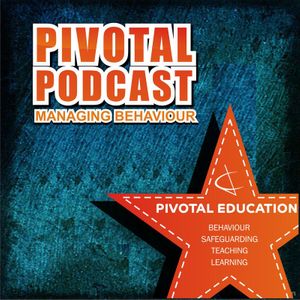Re-framing the Education Debate with Independent Thinker, Ian Gilbert – PP191
Pivotal Podcast - A podcast by Pivotal Education

Categories:
In one of the most thought-provoking and important episodes we have ever had on the podcast, Paul talks to author, teacher and founder of Independent Thinking, Ian Gilbert. The result is a no-holds-barred, uncompromising critique of the state of education in England today and what we should be doing about it. Listen at your own risk – you might end up changing the world. What do the best schools in the poorest communities do to give their children the best start in life? Ian believes it’s actually the similar to the best schools in richer areas – a broad, rich curriculum. In his forthcoming book, The Working Class: Poverty, education and alternative voices, Ian argues that the curriculum in England has been narrowed to the extent that you are ‘either in or out’ – and it tends to be the poorest, the children with the most challenges who are ‘out’. This is what’s happened in the state school system in England: “You’re never going to get an independent school or international school saying, ‘we really want to do the best for our children so we’re going to get rid of art, music, sport, service…'” As you’ll hear in the episode, Ian thinks it’s essential to question the part politics and politicians play in education. He advocates getting an all-party consensus on the direction of education which should be combined with a moratorium on change in a 10-year strategy. Alongside this, as happened in Finland, the level of trust in teachers must be greatly improved. In Ian’s experience, teachers and leaders want to accountable – but to their peers not to politically-driven unaccountable bodies like Ofsted – which Ian would remove as part of the 10-year plan. Are schools becoming less inclusive and what’s the cost of this on our society? Ian thinks they are and that the effect is pernicious. We are in a system which works via punishment and reward. People, though, will always find a way of cheating the system. If that means ‘off-rolling’, exclusion or reducing the curriculum, then we will do it because the system is making us do it. If you are part of a huge academy chain, there is massive political pressure on you to succeed so you will resort to these sorts of tactics. However, Ian still sees in many schools around the country teachers who say that they are not going to play these games – they actively include as many children as they can. If we all stop playing the game, the game won’t work so it depends how far we are prepared to go as educators in saying we are not going to play that game anymore. “There’s been this unspoken agreement that the quality of a school is based purely on results and the purpose of education is to get results.” Ian believes this is not the purpose of education and we need to take this narrative back. He can see the damage this mindset is doing to countries, to schools, to teachers and to individuals. Ian sums this up in the growth mindset mantra: “You are not your exam results.” When comparing overseas education systems to our own around PISA results, Ian says there are two things which are always missed out: * The number of children to are receiving tuition – 90% of children in South Korea receive out-of-school tuition * The rates of suicide and mental health problems in the children of the highest-rated PISA countries “Use your data to improve your children and not the other way round.”